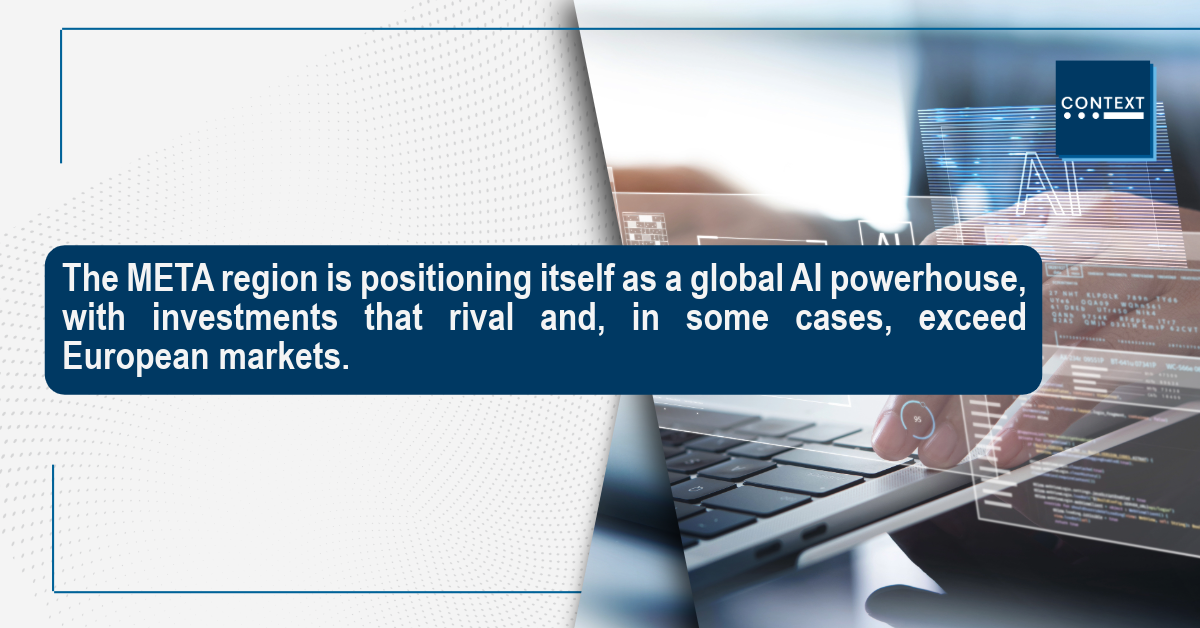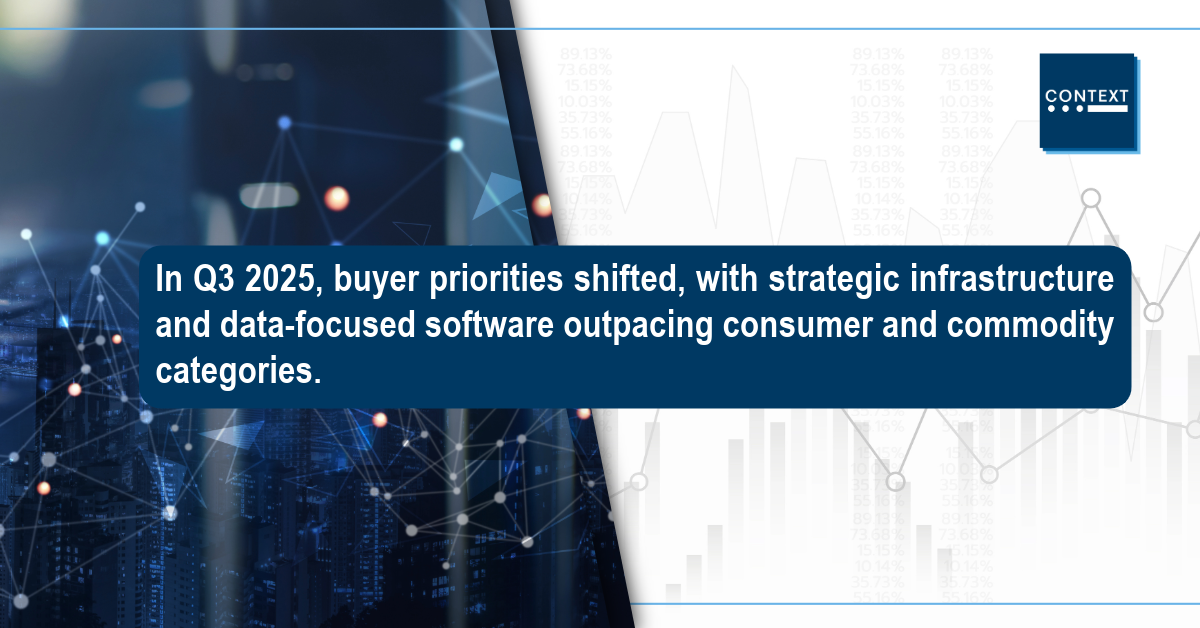As Q3 2025 closes, the Middle East,
Turkey, and Africa (META) region is demonstrating remarkable momentum
in technology infrastructure investment, with artificial intelligence
emerging as the dominant force reshaping the market landscape.
AI Investment Reaches Historic Levels
The META region is positioning
itself as a global AI powerhouse, with investments that rival and,
in some cases, exceed European markets. Saudi Arabia's commitment is
particularly striking—the kingdom invested approximately $1.3 billion
in AI during 2024, with projections to expand this to $17 billion by
2034. This isn't just about future promises; the UAE has been
investing in AI infrastructure since 2008, demonstrating a long-term
strategic vision that's now bearing fruit.

The numbers tell a compelling
story: while Europe has generated around $200 million in
AI-optimised platform revenues through distribution channels in the
first three quarters of 2025, the META region has achieved
approximately $110 million—a remarkable feat considering the
relative market sizes. More impressively, AI-accelerated server
platforms now represent a mainstream component of the regional
infrastructure market, far outpacing Europe's 10% revenue share.
Country-Specific Highlights
United Arab Emirates: The
UAE continues to lead the charge with exceptional infrastructure
growth of 47% year-on-year in Q3. Microsoft's strategic investment
to enable local data processing for Microsoft 365 Copilot, available
in early 2026 and hosted in Abu Dhabi and Dubai data centres,
reinforces the country's position as an AI innovation hub. The UAE
is also the only country in the region showing positive growth in
enterprise networking.
Saudi Arabia: Beyond
massive AI investments, Saudi Arabia is making strategic moves in
education and implementation. The kingdom became one of the first
countries globally to roll out a nationwide AI curriculum, reaching
over 6 million K-12 students. The Red Sea Global Group's partnership
with STC Group, involving an investment exceeding 1.2 billion Saudi
Riyals, aims to expand digital infrastructure across tourism
destinations. Additionally, the AdoptTech program's third phase is
driving real-world deployments of AI and Industry 4.0 technologies
in logistics and industrial facilities.
Turkey: Demonstrating
solid performance with 14% year-on-year growth in Q3, Turkey has
emerged as the second-largest market for AI server platform
revenues in the region with a 27% share. The country showed
particularly strong performance in September with a 38% revenue
increase, driven by impressive server segment growth.
South Africa: While
experiencing a modest Q3 decline of 3%, South Africa ended the
quarter on a positive note with 25% year-on-year growth in
September. The country is seeing strength in server, disk, and
software categories. Notably, Starlink has pledged to comply with
equity equivalent investment policies and intends to invest
approximately $145 million. Microsoft's appointment of Vukani
Mngxati as CEO, effective October 1, 2025, signals continued
commitment to the region.
Infrastructure Market Deep Dive
The Q3 2025 infrastructure market
reveals a fundamental shift in buyer priorities, with strategic
infrastructure and data-focused software decisively outpacing consumer
and commodity categories.

Server Computing:
Traditional server segments are performing solidly, showing a 28%
revenue increase in the first three quarters of 2025 compared to the
same period last year. Even excluding AI-optimised segments, Q3 grew
by 20% year-on-year, indicating robust baseline demand.
Storage Revolution: Flash
arrays are experiencing explosive growth, with revenues up 59%
year-on-year in Q3 and 79% year-to-date in 2025. Flash storage now
commands 30% of total enterprise storage category revenues, driven
by the need for faster storage to handle AI workloads and prevent
GPU starvation during model training. Overall enterprise storage
grew 4% year-on-year, despite a 17% decline in the hyper-converged
infrastructure segment.
Networking Transitions:
While overall enterprise networking revenues declined 8%
year-on-year in Q3—primarily due to software and licensing
segments—hardware components show promise. Wi-Fi 7 has reached a 21%
share of wireless access point revenues, though adoption is slower
than expected as Wi-Fi 6 remains sufficient for most workloads. Data
centre switches emerged as the fastest-growing networking segment,
up 23% year-on-year, directly responding to AI infrastructure
demands for higher bandwidth.
Software and Emerging Trends
Software licensing in Saudi Arabia
gained momentum mid-year, remaining consistently above 2023 levels
with a year-end surge already forming. Data management software has
returned to 2023-2024 levels, reflecting growing enterprise focus on
structured data environments necessary for AI and hybrid cloud
deployments. Security software has maintained steady performance
throughout the year, well above 2023 levels.
Conversely, consumer-facing
categories continue to struggle. Desktop computers, displays, and
notebooks are all trending below previous years, suggesting a
fundamental shift in enterprise priorities away from endpoint
refreshes toward infrastructure investments.
Looking Ahead
As Q4 approaches, all four key META
countries remain above the 2023 index line, creating a positive market
sentiment. The critical question is whether year-end procurement
cycles will deliver late boosts, particularly in software,
infrastructure, and high-value segments—a pattern observed in both
2023 and 2024.
The region's commitment to digital
transformation extends beyond infrastructure. Rwanda's launch of a
cybersecurity development centre in collaboration with Cisco and GIZ
demonstrates Africa's growing focus on talent development and
innovation capacity.
With government-mandated
digitisation initiatives, Vision 2030 projects in full swing, and
improved regional geopolitical stability, the META region is
well-positioned for continued growth. The convergence of strategic
investments, educational initiatives, and real-world AI deployments
suggests that this isn't a temporary spike but rather the beginning
of a sustained technological transformation that will define the
region's economic future for decades to come.
Stay Ahead of META Market Trends
Subscribe
to Context's META webinar for real-time distribution
trends, expert analysis, and regional market intelligence from
industry leaders.